- Home
- John le Carré
A Small Town in Germany Page 6
A Small Town in Germany Read online
Page 6
‘Mister Lumley’s looking for you,’ said the porter. ‘When you can spare a minute, I’m sure.’
He was a young, effeminate man and preferred the other side of the building. ‘He was enquiring most particularly, as a matter of fact. All packed for Germany, I see.’
His transistor radio was going all the time; someone was reporting direct from Hanover and there was a roar in the background like the roar of the sea.
‘Well, you’ll get a nice reception by the sound of it. They’ve already done the library, and now they’re having a go at the Consulate.’
‘They’d done the library by lunchtime. It was on the one o’clock. The police have cordoned off the Consulate. Three deep. There’s not a hope in hell of them getting anywhere near.’
‘It’s got worse since then,’ the porter called after him. ‘They’re burning books in the market place; you wait!’
‘I will. That’s just what I bloody well will do.’ His voice was awfully quiet but it carried a long way; a Yorkshire voice, and common as a mongrel.
‘He’s booked your passage to Germany. You ask Travel Section! Overland route and Second Class! Mr Shawn goes First!’
Shoving open the door of his room he found Shawn lounging at the desk, his Brigade of Guards jacket draped over the back of Turner’s chair. The eight buttons glinted in the stray sunbeams which, bolder than the rest, had penetrated the coloured glass. He was talking on the telephone. ‘They’re to put everything in one room,’ he said in that soothing tone of voice which reduces the calmest of men to hysteria. He had said it several times before, apparently, but was repeating it for the benefit of simpler minds. ‘With the incendiaries and the shredder. That’s point one. Point two, all locally employed staff are to go home and lie low; we can’t pay compensation to German citizens who get hurt on our behalf. Tell them that first, then call me back. Christ Almighty!’ he screamed to Turner as he rang off, ‘have you ever tried to deal with that man?’
‘What man?’
‘That bald-headed clown in E and O. The one in charge of nuts and bolts.’
‘His name is Crosse.’ He flung his bag into the corner. ‘And he’s not a clown.’
‘He’s mental,’ Shawn muttered, losing courage, ‘I swear he is.’
‘Then keep quiet about it or they’ll post him to Security.’
‘Lumley’s looking for you.’
‘I’m not going,’ Turner said. ‘I’m bloody well not wasting my time. Hanover’s a D post. They’ve no codes, no cyphers, nothing. What am I supposed to do out there? Rescue the bloody Crown Jewels?’
‘Then why did you bring your bag?’
He picked up a sheaf of telegrams from the desk.
‘They’ve known about that rally for months. Everyone has, from Western Department down to us. Chancery reported it in March. For once, we saw the telegram. Why didn’t they evacuate staff? Why didn’t they send the kids home? No money, I suppose. No third-class seats available. Well, sod them!’
‘Lumley said immediately.’
‘Sod Lumley too,’ said Turner, and sat down. ‘I’m not seeing him till I’ve read the papers.’
‘It’s policy not to send them home,’ Shawn continued, taking up Turner’s point. Shawn thought of himself as attached rather than posted to Security Department; as resting, as it were, between appointments, and he missed no opportunity to demonstrate his familiarity with the larger political world. ‘Business as usual, that’s the cry. We can’t allow ourselves to be stampeded by mob rule. After all, the Movement is a minority. The British lion,’ he added, making an unconfident joke, ‘can’t allow itself to be upset by the pinpricks of a few hooligans.’
‘Oh it can not; my God it can’t.’
Turner put aside one telegram and began another. He read fast and without effort, with the confidence of an academic, arranging the papers into separate piles according to some undisclosed criterion.
‘So what’s going on? What have they got to lose apart from their honour?’ he demanded, still reading. ‘Why the hell call us in? Compensation’s Western Department’s baby, right? Evacuation’s E and O’s baby, right? If they’re worried about the lease, they can go and cry at the Ministry of Works. So why the hell can’t they leave us in peace?’
‘Because it’s Germany,’ Shawn suggested weakly.
‘Oh roll on.’
‘Sorry if it spoilt something,’ Shawn said with an unpleasant sneer, for he suspected Turner of a more colourful sex life than his own.
The first relevant telegram was from Bradfield. It was marked Flash; it had been despatched at eleven-forty and submitted to the Resident Clerk at two twenty-eight. Skardon, Consul General in Hanover, had summoned all British staff and families to the Residence, and was making urgent representations to the police. The second telegram consisted of a Reuters newsflash timed at eleven fifty-three: demonstrators had broken into the British Library; police were unequal to the situation; the fate of Fräulein Eick [sic] the librarian was unknown.
Hard upon this came a second rush telegram from Bonn: ‘Norddeutscher Rundfunk reports Eick repeat Eick killed by mob.’ But this was in turn immediately contradicted, for Bradfield, through the good offices of Herr Siebkron of the Ministry of the Interior (‘with whom I have a close relationship’), had by then succeeded in obtaining direct contact with the Hanover police. According to their latest assessment, the British Library had been sacked and its books burned before a large crowd. Printed posters had appeared with anti-British slogans such as ‘The Farmers won’t Pay for your Empire!’ and ‘Work for your own bread, don’t steal ours!’ Fräulein Gerda Eich [sic] aged fifty-one of 4 Hohenzollernweg, Hanover, had been dragged down two flights of stone steps, kicked and punched in the face and made to throw her own books into the fire. Police with horses and anti-riot equipment were being brought in from neighbouring towns.
A marginal annotation by Shawn stated that Tracing Section had turned up a record of the unfortunate Fräulein Eich. She was a retired school teacher, sometime in British Occupational employment, sometime secretary of the Hanover Branch of the Anglo-German Society, who in 1962 had been awarded a British decoration for services to international understanding.
‘Another anglophile bites the dust,’ Turner muttered.
There followed a long if hastily compiled summary of broadcasts and bulletins. This, too, Turner studied with close application. No one, it seemed, and least of all those who had been present, was able to say precisely what had triggered off the riot, nor what had attracted the crowd towards the library in the first place. Though demonstrations were now a commonplace of the German scene, a riot on this scale was not; Federal authorities had confessed themselves ‘deeply concerned’. Herr Ludwig Siebkron of the Ministry of the Interior had broken his habitual silence to remark to a Press Conference that there was ‘cause for very real anxiety’. An immediate decision had been taken to provide additional protection for all official and quasi-official British buildings and residences throughout the Federal Republic. The British Ambassador, after some initial hesitation, had agreed to impose a voluntary curfew on his staff.
Accounts of the incident by police, press and even delegates themselves were hopelessly confused. Some declared it was spontaneous; a collective gesture aggravated by the word ‘British’ which happened to be exhibited on the side of the library building. It was natural, they said, that as the day of decision in Brussels drew rapidly closer, the Movement’s policy of opposition to the Common Market should assume a specifically anti-British form. Others swore they had seen a sign, a white handkerchief that fluttered from a window; one witness even claimed that a rocket had risen behind the town hall and emitted stars of red and gold. For some the crowd had surged with a positive impulse, for others it had ‘flowed’; for others again it had trembled. ‘It was led from the centre,’ one senior police officer reported. ‘The periphery was motionless until the centre moved.’ ‘Those at the centre,’ Western Radio maintained, ‘kept their
composure. The outrage was perpetrated by a few hooligans at the front. The others were then obliged to follow.’ On one point only they seemed to agree: the incident had taken place when the music was loudest. It was even suggested by a woman witness that the music itself had been the sign which started the crowd running.
The Spiegel correspondent, on the other hand, speaking on Northern Radio, had a circumstantial account of how a grey omnibus chartered by a mysterious Herr Meyer of Luneburg conveyed ‘a bodyguard of thirty picked men’ to the town centre of Hanover one hour before the demonstration began and that this bodyguard, drawn partly from students and partly from young farmers, had formed a ‘protective ring’ round the speaker’s podium. It was these ‘picked men’ who had started the rush. The entire action had therefore been inspired by Karfeld himself. ‘It is an open declaration,’ he insisted, ‘that from now on, the Movement proposes to march to its own music.’
‘This Eich,’ Turner said at last. ‘What’s the latest?’
‘She’s as well as can be expected.’
‘How well’s that?’
‘That’s all they said.’
‘Oh fine.’
‘Fortunately neither Eich nor the Library are a British responsibility. The Library was founded during the Occupation but handed over to the Germans quite soon afterwards. It’s not controlled and owned exclusively by the Land authority. There’s nothing British about it.’
‘So they’ve burned their own books.’
Shawn gave a startled smile.
‘Well yes, actually,’ he said. ‘Come to think of it, they have. That’s rather a useful point; we might even suggest it to Press Section.’
The telephone was ringing. Shawn lifted the receiver and listened.
‘It’s Lumley,’ he said, putting his hand over the mouthpiece. ‘The porter told him you’re in.’
Turner appeared not to hear. He was studying another telegram; it was quite a short telegram, two paragraphs, not more; it was headed ‘personal for Lumley’ and marked ‘immediate’ and this was the second copy passed to Turner.
‘He wants you, Alan.’ Shawn held out the receiver.
Turner read the text once and then read it again. Rising, he went to the steel cupboard and drew out a small black notebook, unused, which he thrust into the recesses of his tropical suit.
‘You stupid bugger,’ he said very quietly, from the door. ‘Why don’t you learn to read your telegrams? All the time you’ve been bleating about fire extinguishers we’ve had a bloody defector on our hands.’
He held up the sheet of pink paper for Shawn to read.
‘A planned departure, that’s what they call it. Forty-three files missing, not one of them below Confidential. One green classified Maximum and Limit, gone since Friday. I’ll say it was planned.’
Leaving Shawn with the telephone still in his hand, Turner thudded down the corridor in the direction of his master’s room. His eyes were a swimmer’s eyes, very pale, washed colourless by the sea.
Shawn stared after him. That’s what happens, he decided, when you open your doors to the other ranks. They leave their wives and children, use filthy language in the corridors and play ducks and drakes with all the common courtesies. With a sigh, he replaced the receiver, raised it again and dialled News Department. This was Shawn, he said, S-H-A-W-N. He had had rather a good idea about the riots in Hanover, the way one might play it at Press Conference: it was nothing to do with us after all, if the Germans decided to burn their own books … He thought that might go down pretty well as an example of cool English wit. Yes, Shawn, S-H-A-W-N. Not at all; they might even have lunch together some time.
Lumley had a folder open before him and his old hand rested on it like a claw.
‘We know nothing about him. He’s not even carded. As far as we’re concerned, he doesn’t exist. He hasn’t even been vetted, let alone cleared. I had to scrounge his papers from Personnel.’
‘And?’
‘There’s a smell, that’s all. A foreign smell. Refugee background, emigrated in the thirties. Farm School, Pioneer Corps, Bomb Disposal. He gravitated to Germany in forty-five. Temporary sergeant; Control Commission; one of the old carpet-baggers by the sound of it. Professional expatriate. There was one in every mess in Occupied Germany in those days. Some survived, some drifted into the consulates. Quite a few of them reverted; went into the night or took up German citizenship again. A few went crooked. No childhood, most of them, that’s the trouble. Sorry,’ Lumley said abruptly, and almost blushed.
‘Any form?’
‘Nothing to set the Thames on fire. We traced the next of kin. An uncle living in Hampstead: Otto Harting. Sometime adoptive father. No other relations living. He was in the pharmaceutical business. More an alchemist by the sound of it. Patent medicines, that kind of thing. He’s dead now. Dead ten years. He was a member of the Hampstead Branch of the British Communist Party from forty-one to forty-five. One conviction for little girls.’
‘How little?’
‘Does it matter? His nephew Leo lived with him for a bit. Something may have rubbed off. The old man might even have recruited him then, I suppose … Long-term penetration. That would fit the mould. Or someone may have reminded him of it later on. They never let you go, mind, once you’ve had a taste of it. Bad as Catholics.’
Lumley hated faith.
‘What’s his access?’
‘Obscure. His function is listed as Claims and Consular, whatever that means. He has diplomatic rank, just. A Second Secretary. You know the kind of arrangement. Unpromotable, unpostable, unpensionable. Chancery gave him living space. Not a proper diplomat.’
‘Lucky bloke.’
Lumley let that go.
‘Entertainment allowance’ – Lumley glanced at the file – ‘a hundred and four pounds per annum, to be spread over fifty cocktail guests and thirty-four dinner guests. Accountable. Pretty small beer. He’s locally employed. A temporary, of course. He’s been one for twenty years.’
‘That leaves me sixteen to go.’
‘In fifty-six he put in an application to marry a girl called Aickman. Margaret Aickman. Someone he’d met in the Army. The application was never pursued, apparently. There’s no record of whether he’s married since.’
‘Perhaps they’ve stopped asking. What are the missing files about?’
Lumley hesitated. ‘Just a hotchpotch,’ he said casually, ‘a general hotchpotch. Bradfield’s trying to put a list together now.’ They could hear the porter’s radio blaring again in the corridor.
Turner caught the tone and held on to it: ‘What sort of hotchpotch?’
‘Policy,’ Lumley retorted. ‘Not your field at all.’
‘You mean I can’t know?’
‘I mean you needn’t know.’ He said this quite casually; Lumley’s world was dying and he wished no one ill. ‘He’s chosen a good moment, I must say,’ he continued, ‘with all this going on. Perhaps he just took a handful and ran for it.’
‘Discipline?’
‘Nothing much. He got in a fight five years ago in Cologne. A night-club brawl. They managed to hush it up.’
‘And they didn’t sack him?’
‘We like to give people a second chance.’ Lumley was still deep in the file, but his tone was pregnant with innuendo.
He was sixty or more, coarse-spoken and grey; a grey-faced, grey-clothed owl of a man, hunched and dried out. Long ago he had been Ambassador to somewhere small, but the appointment had not endured.
‘You’re to cable me every day. Bradfield is arranging facilities. But don’t ring me up, do you understand? That direct line is a menace.’ He closed the folder. ‘I’ve cleared it with Western Department, Bradfield’s cleared it with the Ambassador. They’ll let you go on one condition.’
‘That’s handsome of them.’
‘The Germans mustn’t know. Not on any account. They mustn’t know he’s gone; they mustn’t know we’re looking for him; they mustn’t know there’s been a leak.’
/>
‘What if he’s compromised secret Nato material? That’s as much their pigeon as ours.’
‘Decisions of that kind are none of your concern. Your instructions are to go gently. Don’t lead with your chin. Understand?’
Turner said nothing.
‘You’re not to disturb, annoy or offend. They’re walking on a knife edge out there; anything could tilt the balance. Now, tomorrow, any time. There’s even a danger that the Huns might think we were playing a double game with the Russians. If that idea got about it could balls everything up.’
‘We seem to find it hard enough,’ Turner said, borrowing from Lumley’s vocabulary, ‘playing a single game with the Huns.’
‘The Embassy have got one idea in their heads, and it’s not Harting and it’s not Karfeld and least of all is it you. It’s Brussels. So just remember that. You’d better, because if you don’t you’ll be out on your arse.’
‘Why not send Shawn? He’s tactful. Charm them all, he would.’
Lumley pushed a memorandum across the desk. It contained a list of Harting’s personal particulars. ‘Because you’ll find him and Shawn won’t. Not that I admire you for that. You’d pull down the whole forest, you would, to find an acorn. What drives you? What are you looking for? Some bloody absolute. If there’s one thing I really hate it’s a cynic in search of God. Maybe a bit of failure is what you need.’
‘There’s plenty of it about.’
‘Heard from your wife?’
‘No.’
‘You could forgive her, you know. It’s been done before.’
‘Jesus, you take chances,’ Turner breathed. ‘What the hell do you know about my marriage?’

 The Honorable Schoolboy
The Honorable Schoolboy The Pigeon Tunnel: Stories From My Life
The Pigeon Tunnel: Stories From My Life Single & Single
Single & Single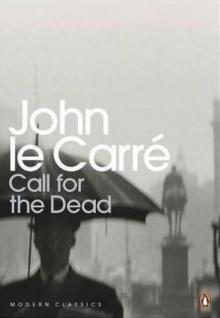 The Spy Who Came in From the Cold
The Spy Who Came in From the Cold The Looking Glass War
The Looking Glass War The Night Manager
The Night Manager A Delicate Truth
A Delicate Truth A Perfect Spy
A Perfect Spy The Little Drummer Girl
The Little Drummer Girl Absolute Friends
Absolute Friends A Murder of Quality AND Call for the Dead
A Murder of Quality AND Call for the Dead The Russia House
The Russia House The Tailor of Panama
The Tailor of Panama Tinker, Tailor, Soldier, Spy
Tinker, Tailor, Soldier, Spy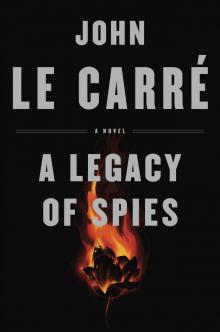 A Legacy of Spies
A Legacy of Spies The Mission Song
The Mission Song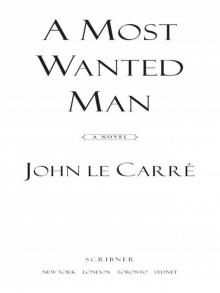 A Most Wanted Man
A Most Wanted Man John Le Carré: Three Complete Novels
John Le Carré: Three Complete Novels The Secret Pilgrim
The Secret Pilgrim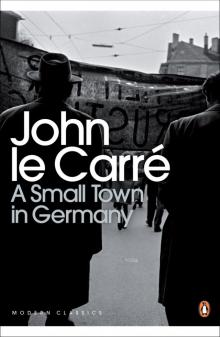 A Small Town in Germany
A Small Town in Germany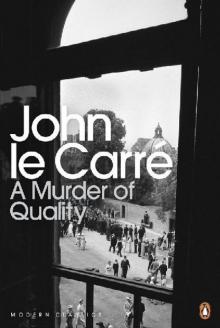 A Murder of Quality
A Murder of Quality Smiley's People
Smiley's People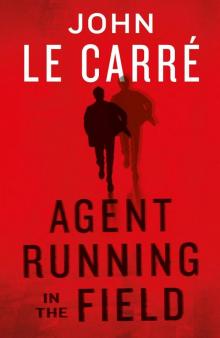 Agent Running in the Field
Agent Running in the Field The Spy Who Came in from the Cold s-3
The Spy Who Came in from the Cold s-3 The Pigeon Tunnel
The Pigeon Tunnel The Russia House - 13
The Russia House - 13 The Honourable Schoolboy
The Honourable Schoolboy Call For The Dead s-1
Call For The Dead s-1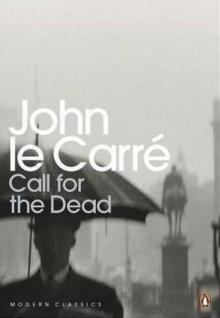 Call for the Dead
Call for the Dead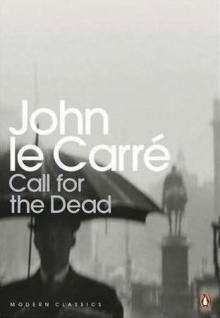 Call for the Dead - 1
Call for the Dead - 1